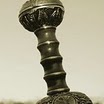Is your frame of mind helping you to achieve your goals?
You want to study history but...
[1.] You're opting out of a good opportunity to refine your research skills.
Have you taken the opportunity to consult all of the following resources?
* America: History and Life and its companion Historical Abstracts
* The American Historical Association's Directory of History Departments and Organizations in the United States and Canada
* The Society of Military Historians' directory
* The professional academic journals that specialize in your areas of interest, including (but not limited to):
*
* American Historical Review
* Armed Forces and Society
* Diplomatic History
* European History Quarterly
* International Security
* Journal of American History
* Journal of Cold War Studies
* Journal of International History
* Journal of Military History
* Journal of Modern History
* Naval War College Review
* Reviews in American History






 , and Texas A&M
, and Texas A&M 
 .)
.)

Bookmarks